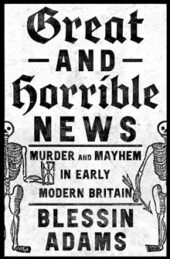Merchants, in the literature of the sixteenth and seventeenth centuries, are ubiquitous. One finds them represented on the stage, for example, in the works of Shakespeare and Jonson (‘let’s see him creep!’). The word itself conjures up a host of senses: the jingling of coins in purses, the frantic pounding of footsteps as news of expected cargo is awaited, and the rich scent of spices. The popular conception of early modern merchants is, predominantly, founded on Shakespeare’s The Merchant of Venice – a tale of risk and reward. What Edmond Smith has done in his Merchants: The Community that Shaped England’s Trade and Empire is to pull back the curtain on a vibrant, complex world of competing interests, overlapping social networks, surprisingly high moral ideals and values, and tireless industry.
This scholarly yet highly readable – indeed, page-turning – text is certainly timely. As the UK faces questions over its own trading future, it is useful to look back on its member nations’ history of global trade. The book is, sensibly, thematically organised, with chapters detailing the art of merchandising; the companies and institutions which oversaw trade; the daily lives of merchants and apprentices – and how those lives were governed; varying levels of control by monopolists; and the always interesting relationship between the English government and enterprising subjects.
Throughout, Smith demonstrates an exemplary handling of sources, weaving together an enormous variety (both printed and manuscript) into a delightful narrative. The resultant history of the trade – or art – of merchandising becomes a wide and compelling picture of innumerable interesting personalities trading, arguing, and organising their communities across place and time. Throughout a series of (often amusing, sometimes thrilling, never boring) vignettes, one gets a real sense of how decisions were on a day-to-day basis by men who had invested much and thus had much to lose. Surprises abound. Preachers, for example, were chosen to accompany voyages not necessarily because they were good, but because they had experience at sea. Due to the expanding Dutch community resident in London in the early seventeenth century, the decision was made to print regulations on the manufacture of draperies in both English and Dutch. Aspiring merchants were encouraged to learn the customs and manners of other countries in order to more easily transact business abroad. Earl modern England’s expanding trading empire was nothing if not multicultural.
The overall impression Merchants gives is one of liveliness, community, and vibrancy. Smith, very much to his credit, does not provide a dull history, but a living, breathing one, in which the titular merchants speak in their own voices and seek their own riches (often independently of the state, which certainly did not exert monolithic control over their activities). Readers will discover how what began as a loose collection of men on an island on the edge of Europe grew into a thriving, adventurous, heterogenous group of enterprisers who paved the way for a truly outward-looking global state.
Steven Veerapen is a historian and author of The Queen’s Gold.







